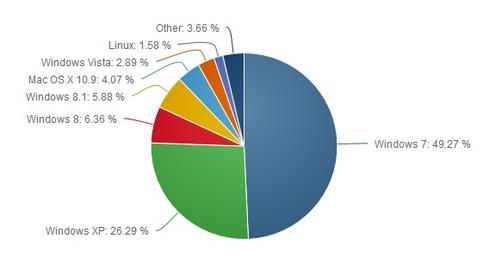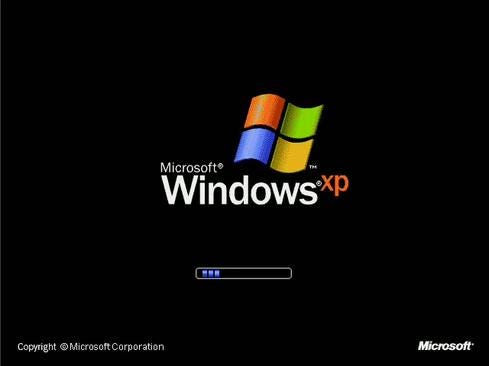Windows XP has twice the market share of Windows 8/8.1. But it is Windows 7 that still rules the desktop.


Windows XP Game Over: 9 Upgrade Options
Windows XP Game Over: 9 Upgrade Options (Click image for larger view and slideshow.)
Microsoft stopped supporting Windows XP around three weeks ago, but the company still included it in Thursday's fix for the recently disclosed Internet Explorer zero-day bug. The decision probably made a lot of people happy. More than a quarter of desktop Internet users were still relying on the aging OS in April, according to the newest figures from Web tracking firm Net Applications.
Though millions of XP holdouts remain, the OS dropped 1.4 percentage points between March and April. It has also shed substantial market share over the last year. Net Applications, which calculates OS market share by tracking unique visits to the 40,000-plus websites in its network, said XP accounted for 26.29% of desktop-based Internet users in April, down significantly from 38.31% at the same point in 2013.
[Why are so many people still using Windows XP? Read Windows XP Holdouts: 6 Top Excuses.]
Windows 7 has been the biggest beneficiary of XP's decline. It claimed almost half of desktop Internet users in April, with 49.27% of the market. The figure rose from 48.77% in March and was up meaningfully from the 44.72% share Windows 7 held a year ago.
Windows 8 and 8.1 also benefited from March's modest XP exodus, though adoption of Microsoft's newest OSs remained mediocre overall. Windows 8 basically held steady in April, with just under a 6.4% share, while Windows 8.1 increased substantially, from 4.89% to 5.88%. Windows 8 and 8.1 combined for 12.24% of the market, a nice jump from 11.3% the month prior.
Windows 8.1 has been a bit of an oddity. The update is free for Windows 8 users. Given that critics and users blasted the original version, you might think adoption of Windows 8.1 should be higher, especially since Microsoft just released a new update aimed at the mouse-and-keyboard users who voiced many of the early complaints. Nevertheless, Windows 8.1 accounts for less than half of the combined 8/8.1 share.
The new figures include some silver linings for Microsoft's new platform. Windows 8.1 jumped nearly a percentage point month-over-month. The aforementioned update likely contributed to the uptick, though it's hard to say how much. If the update had been a hit, Windows 8's market share would have declined precipitously as existing users installed 8.1. No such decline occurred, which indicates Windows 8.1 gained share through new device sales.
Mac OS X 10.9 (a.k.a. Mavericks) was the top non-Windows performer. It hit 4.07%, up from 3.75%. Mavericks is free to most OS X users and now accounts for over half the Mac user base, which Net Applications pegged at 7.62% of the market. Various Windows versions held 90.8%, a slight drop from March. Though dominant, Windows is down from a recent high of 91.56% last July, and it hasn't claimed more than 91% since August.
What about all those people who promised to ditch Windows XP for Linux? Evidently, not many of them followed through. Linux hit 1.58% of the desktop OS market in April, up from 1.49% the month before, but still lower than the 1.73% it snared in December.
As for the previously referenced IE zero-day, the Net Applications data suggests many people could be at risk. The firm says various IE versions combined for nearly 58% of Internet users in April. Microsoft plans to release a fix for supported systems on Thursday, though some users have likely already taken precautions such as disabling Flash, switching to a new browser, or using IE's Enhanced Protected Mode.
Could the growing movement toward open-source hardware rewrite the rules for computer and networking hardware the way Linux, Apache, and Android have for software? Also in the Open Source Hardware issue of InformationWeek: Mark Hurd explains his "once-in-a-career opportunity" at Oracle.
About the Author(s)
You May Also Like







